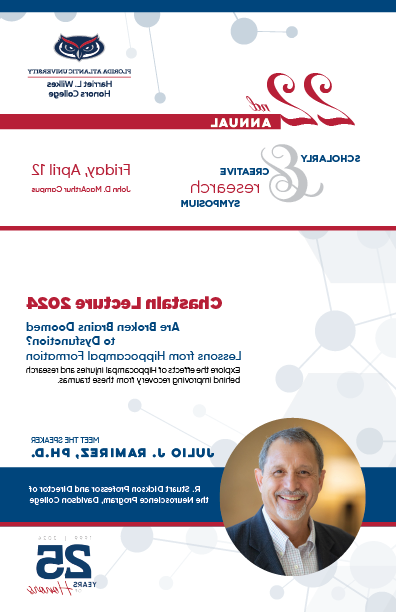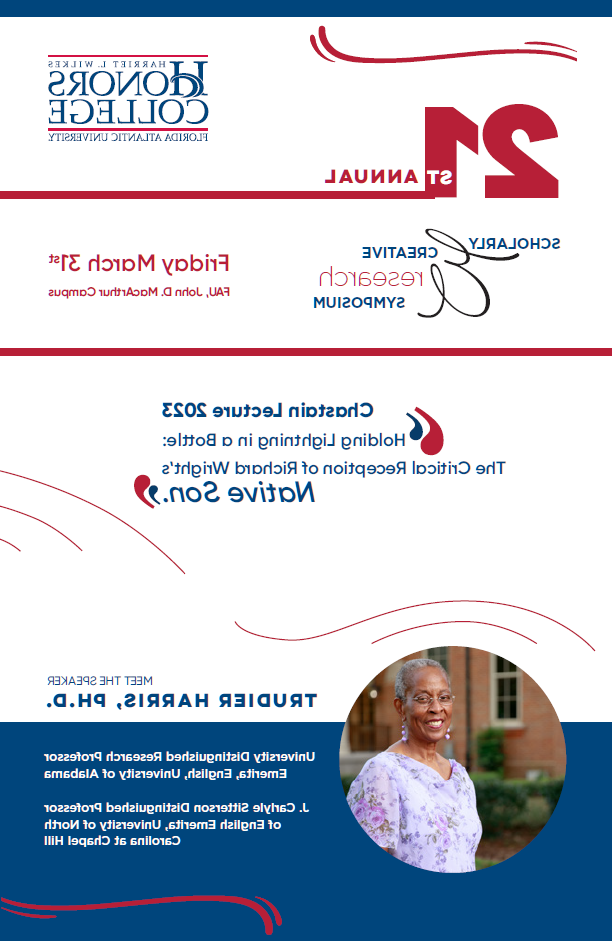Wilkes Honors College Symposium
Symposium Schedule & Program
Friday, April 4th, 2025
| Time | Event | Location |
|---|---|---|
| 9:00 a.m. - 10:15 a.m. | Session 1: Oral Presentations | AD Bldg |
| 10:30 a.m. - 11:30 a.m. | Session 2: Oral Presentations | AD Bldg |
| 12:00 p.m. - 1:00 p.m. | Break | Break |
| 1:00 p.m. - 2:00 p.m. | Chastain Guest Lecturer:
|
AD 119, Auditorium |
| 2:00 p.m. - 4:00 p.m. |
Session 3: Visual Arts Projects, Poster Session |
SR 149 (Visual Arts) HC Bldg (Poster Session) |
Important Dates for 2025
| Date | Event / Task |
|---|---|
| 1/6/25 | Submission Opens for All Abstracts |
| TBD by advisor |
Draft abstracts are due to advisors for review |
| 2/3/25 | Submission Deadline (closes) : Final abstracts are due |
| 2/17/25 | Students are notified of acceptance |
| TBD by advisor |
Draft posters are due to advisors for review |
| 3/10/25 |
POSTERS are due to their faculty advisor for review/edits
|
| 3/26/25 |
Presentation schedule finalized and posted |
| 3/28/25 | Submit PowerPoint or PDF files for POSTERS and ART PRESENTATIONS |
|
Friday, April 4th, 2025 |
Symposium for Scholarly and Creative Research |
Click here for Abstract Submission form
Abstract Registration Instructions
Your abstract of 150 words or less should describe succinctly the major result or point of your presentation. The abstract provides an opportunity for you to draw an audience to your presentation, so try to make the abstract both interesting and informative. You are required to consult with your thesis advisor or your course instructor for advice on writing your abstract.
Title: No limit in size, but please be reasonable.
Author(s): List all people who contributed significantly to this research. List the presenting author first.
Email: The primary email address of the presenting author should be included. Email addresses of other authors may be given as well.
Abstract: No more than 150 words. This is a concise summary of the work to be presented (see example below).
Type of presentation: Check the appropriate box(es) for your work. If you will be presenting something other than a talk or poster, please provide information regarding how the work will be displayed.
Type of project: If this is a senior thesis project, indicate the expected semester of graduation (e.g., Spring 10). If this is work assigned for a course, provide course number and name (e.g., ISC 4933 Data Analysis). If you are presenting work completed for another purpose, such as an internship, please provide brief details.
Advisor/Professor: List your thesis advisor or course professor as appropriate. If the project was completed for some other purpose, list the person responsible for overseeing the project.
Sample Abstract:
«An increase in task difficulty or in time pressure during the performance of cognitive tasks decreased the ability of older adults to recall the tasks at a later time. Adult age differences in recall of cognitive tasks were smaller for easier than for more difficult tasks, and age differences were smaller for cognitive tasks without time pressure than for tasks with time pressure. Older adults may have difficulty remembering difficult cognitive tasks and tasks with time pressure because of an increase in anxiety. During difficult or time pressured cognitive tasks, older adults may have trouble inhibiting negative thoughts about their performance, and thus they may devote fewer working memory resources to aspects of the tasks that would be beneficial for task recall.»
Professional Courtesy: Please keep in mind that if you submit an abstract for a paper or poster, you are committing to making a presentation at the Symposium. Backing out of a talk at the conference is unacceptable in the academic world, except in cases of absolute emergency. When papers are withdrawn after acceptance, some professional organizations will bar the contributor from making another presentation for two years. The Honors College Symposium is a professional conference, and presenters are expected to treat it as such.
Poster Guidelines & Submission Instructions
Creating your poster
Use the poster template to create your poster.
- Your banner should contain a title for your project, the authors, and the college.
-
Do not change the font colors and size from those in the template. Do not move or resize the logo. Do not change the color of the background.
- The font for text within the poster should be no smaller than 32 point.
- You are encouraged to use graphs, photographs, and other visual aides.
- The poster should be 48 inches wide by 36 inches high.
- Your poster will be hung prior to the Symposium. Do not remove your poster after it is hung.
- Save your poster as lastname_firstname.pptx.
Submission instructions
Poster Submission- E-mail your poster PowerPoint (.pptx) or PDF file to your advisor using the words "Poster Submission" as the subject line.
- Your faculty advisor will review the file and once they approve of it, please submit the project here.
- The Committee will review and approve the files.
- Once approved, the poster will be printed.
Fine Art Submission
Coordinate with your art faculty.
Professional Courtesy:Please keep in mind that if you submit an abstract for a paper or poster, you are committing to making a presentation at the Symposium. Backing out of a talk at a conference is unacceptable in the academic world, except in cases of absolute emergency. When papers are withdrawn after acceptance, some professional organizations will bar the contributor from making another presentation for two years. The Honors College Symposium is a professional conference, and presenters are expected to treat it as such.
Giving a Speech: Tips & Tricks
Download the printable version.
General Guidelines
- The talk should be no more than 10 minutes, leaving 4-5 minutes for questions. (The next speaker will begin immediately after. We are on a tight time schedule of 15 minutes per speaker, which includes introduction by the moderator, the talk, and the questions/answers).
- Practice, practice, practice. Your real talk will take about 10-20% longer than your practice talk.
- Dress appropriately.
- Introduce your topic in its proper context at the very beginning of the talk. (What is the question? Why is it important? Who cares about it? Who studied it before you did? What is your contribution? What will you tell us?)
- Speak loudly, slowly, and clearly.
- Be professional: don't use profanities, colloquialisms, and space fillers (such as "you know," "so," "um," "uh," or "like").
- Know your audience.
- Avoid special terminology and technical formulas.
- Define all key terms before you use them.
- Don't go over time. It's impolite to your audience and the other speakers.
- Don't ask for questions at the end of the talk—let the moderator do it.
Visual Aids
Use visual aids with care—this is the most efficient way to improve your presentation. Remember that the visual aids are exactly that—aids. They are supposed to help your talk, not to be your talk.- Don't read the text on the slides—explain it.
- Prepare separate notes for each slide. Be careful not to block the view - keep your shoulder away from the projector.
- Have a pointing device handy.
- Maintain eye contact with your audience—don't look at the screen or at your notes too much.
Tips for Posters
For Scientific posters, be sure to clearly state the question your study addresses, your hypotheses, and your conclusions. Give a brief description of your methods.Use handouts to supplement your poster, if appropriate.
Place related materials close together, then highlight themes by framing collections of material with blank space.
Tips for Powerpoint
Keep in mind that using PowerPoint will not make a bad talk look good! If you use PowerPoint, the following apply:- Place the title, author(s), and affiliation (or project status) on the first slide.
- Use a few well-written slides. Count about 2 min per slide (e.g. a 15-minute talk should have no more than 6-8 slides).
- Each slide should clarify only one topic and have a short (one-line) title.
- Print a few well-spaced lines (12 or less) per slide.
- Use standard font of large size: at least 28 pt or 1/2" in height. (Sans serif fonts, such as Arial, look better than serif fonts, such as Times Roman, in PowerPoint.)
- Make sure your graphs, charts, pictures, photos are large enough and clearly visible.
- Use a few basic colors (black, blue, red). Don't mix red with green—this particular color combination can be difficult to read.
- Don't depend solely on the computer.
- Don't go wild with the colors; use one of the professional-looking built-in color schemes. Make sure your slides have enough intensity contrast between the foreground and background colors.
- Don't use cute but distracting and annoying transitions, animations, sounds, etc.
- Press the space bar to go to the next slide and the Backspace key to go to the previous slide (it's easier than fumbling with the mouse in the dark).
- Run your PowerPoint presentation in any HC classroom to make sure that your version of PowerPoint is compatible with the version used in HC classrooms and that your color schemes are effective using the HC version of PowerPoint.
22nd Annual Symposium for Scholarly and Creative Research
April 12th, 2024
About the Wilkes Honors College Symposium
The 22nd annual Harriet L. Wilkes Honors College Symposium celebrates honors students and their research and creative activities in a one-day event that includes a series of concurrent talks, a poster session, a visual arts presentation, as well as a keynote address. With this unique event, the Wilkes Honors College showcases the diverse academic achievements of our students, and particularly those students in the Class of 2024.
Symposium Program
Keynote Speaker
Julio J. Ramirez, Ph.D.

Dr. Julio J. Ramirez is the R. Stuart Dickson Professor and Director of the Neuroscience Program at Davidson College. Dr. Ramirez's research interests include the recovery of function after central nervous system injury, with an emphasis on determining the functional significance of hippocampal neuroplasticity. His teaching, mentoring, and research efforts have been supported with numerous grants from the National Science Foundation and the National Institutes of Health. Over the years, he has received recognition of his efforts to promote education and mentorship in neuroscience and biological psychology. Dr. Ramirez was the 1989 North Carolina Professor of the Year and National Gold Medal Professor of the Year. He received the 2009 Presidential Award for Excellence in Science, Mathematics, and Engineering Mentoring from President Barack Obama in recognition of his national leadership in mentoring undergraduate students and junior faculty from underrepresented groups in the sciences. In 2015, he was awarded the Bernice Grafstein Award for Outstanding Accomplishments in Mentoring from the Society for Neuroscience. In 2024, he was presented with the APS Mentor Award (a lifetime achievement award) from the Association for Psychological Science. He was the Founding President of the Faculty for Undergraduate Neuroscience, a national organization dedicated to promoting undergraduate education in the neurosciences. At the Society for Neuroscience, Dr. Ramirez is a former Co-Director of the Neuroscience Scholars Program and is a former Treasurer of the Society.
In a talk titled "Are Broken Brains Doomed to Dysfunction? Lessons from the Hippocampal Formation," Dr. Ramirez will explore the effects of Hippocampal injuries and his research behind improving recovery from these traumas.
Abstract: Recovery of function after central nervous system injury remains one of the great mysteries in neuroscience and neurology. The brain is now understood to be a self-reorganizing system that is highly responsive to injury. Over the last 50 years, research focusing on the hippocampus and related structures, areas of the brain critical for learning and memory, has demonstrated that the hippocampus undergoes dramatic structural reorganization known as axonal sprouting after injury to the entorhinal cortex, the major cortical input to the hippocampus. Dr. Ramirez and his students have been exploring whether axonal sprouting contributes to the recovery of memory function after brain injury in rats. To date, they have shown that accelerating hippocampal sprouting can indeed enhance recovery of memory function after entorhinal injury.
Invited Speaker:
Trudier Harris, Ph.D.

Distinguished Research Professor of English Emerita
University of Alabama and University of North Carolina at Chapel Hill
Chastain Lecture 2023: "Holding Lightning in a Bottle: The Critical Reception of Richard Wright's Native Son."
Trudier Harris is a University Distinguished Research Professor of English Emerita, the University of Alabama, and J. Carlyle Sitterson Distinguished Professor of English Emerita, the University of North Carolina at Chapel Hill, where she taught courses in African American literature and folklore. Among her twenty-five published books are From Mammies to Militants: Domestics in Black American Literature (1982), Exorcising Blackness: Historical and Literary Lynching and Burning Rituals (1984), Fiction and Folklore: The Novels of Toni Morrison (1991), The Power of the Porch: The Storyteller’s Craft in Zora Neale Hurston, Gloria Naylor, and Randall Kenan (1996), The Scary Mason-Dixon Line: African American Writers and the South (2009), Martin Luther King Jr., Heroism, and African American Literature (2014), and Depictions of Home in African American Literature (2021; Choice "Outstanding Academic Title" for 2022). She published her memoir, Summer Snow: Reflections from a Black Daughter of the South, in 2003. In 2002, she received the Eugene Current-Garcia Award for selection as Alabama’s Distinguished Literary Scholar. The University of North Carolina at Chapel Hill created the “Trudier Harris Distinguished Professorship” in her honor in 2014. In 2018, she received an honorary degree from The College of William and Mary, the Richard Beale Davis Award for Lifetime Achievement in Southern Literary Studies, and a Resident Fellowship to the National Humanities Center. Harris was named the recipient of the 2018 Clarence E. Cason Award for Nonfiction Writing by the College of Communication & Information Sciences at the University of Alabama. She also won the 2018 SEC Faculty Achievement Award at the University of Alabama (which is a “Professor of Year” designation). In February of 2021, the Black Faculty and Staff Association at the University of Alabama inaugurated the “Dr. Trudier Harris Intercollegiate Black History Scholars Bowl.” On 5 February 2022, teams from six schools competed in the Bowl. On 10 March 2023, Harris will be inducted into the Alabama Writers Hall of Fame.

